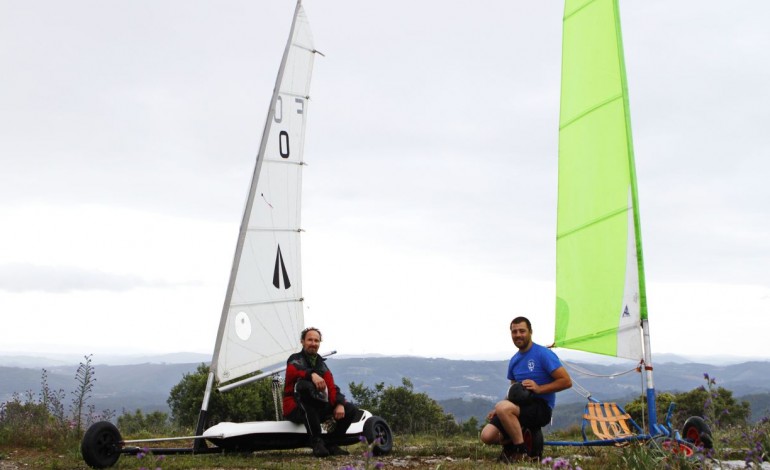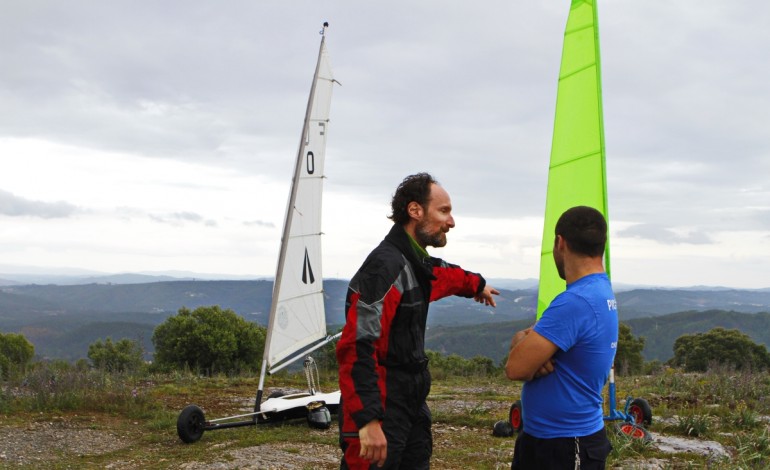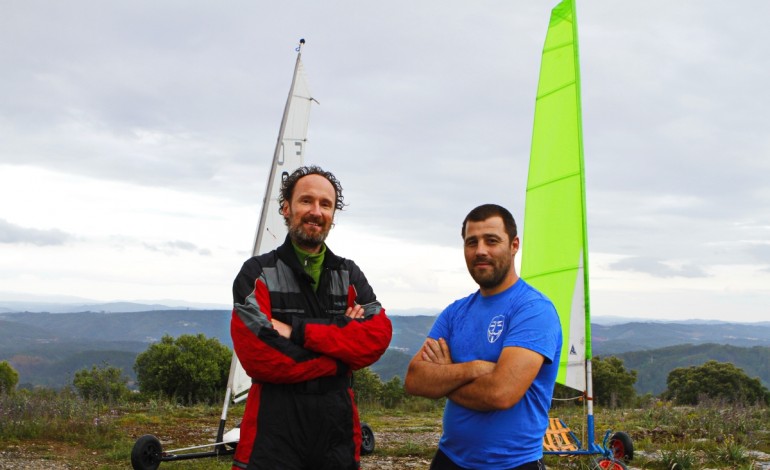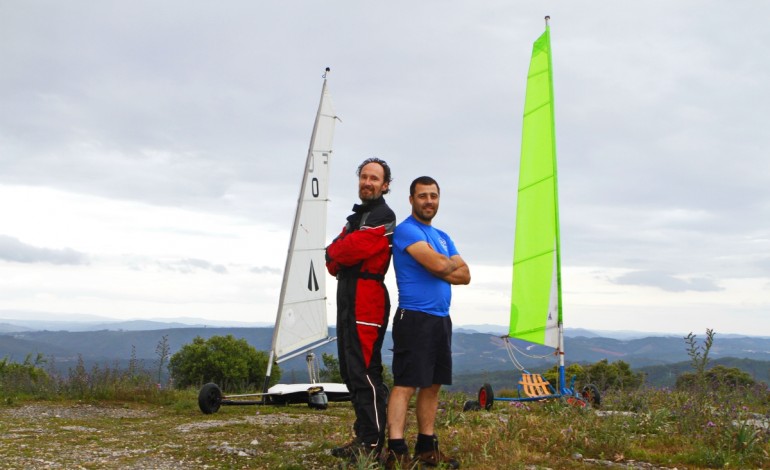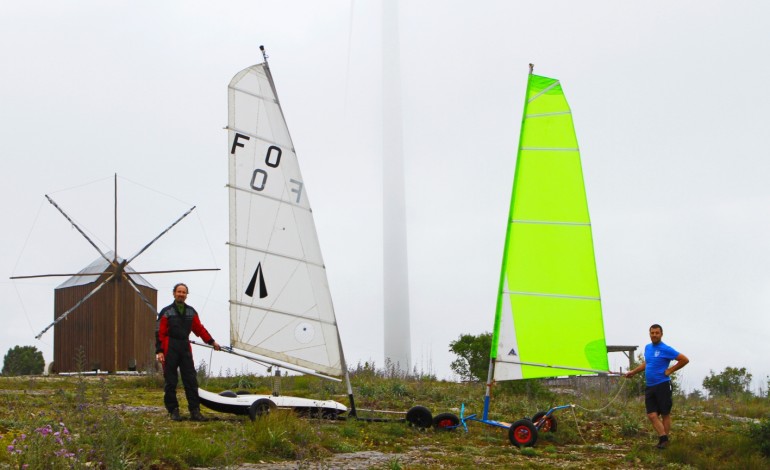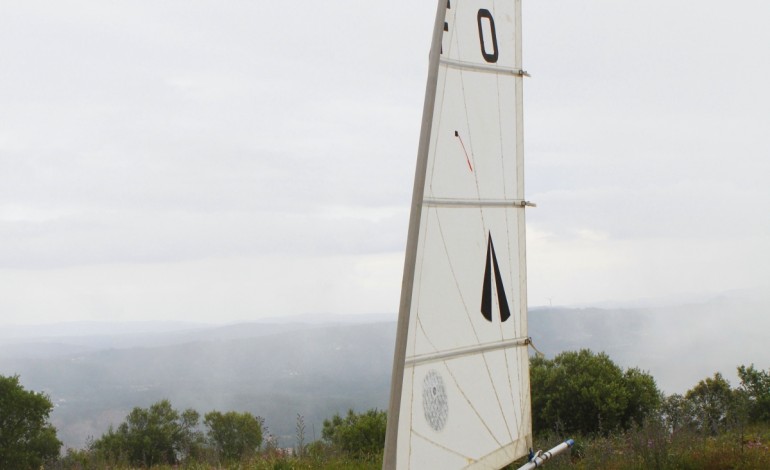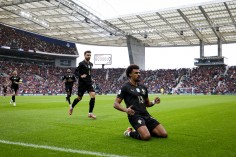Desporto
Portuguese team of land sailing sets sail for the conquest of Europe (with gallery)
Friendship. After three years of land sailing together, David and Dário share a passion for literally "flying low" in sailing cars. In September, they will represente Portugal in the 52nd European Championship of this sport.
By Bruno Lopes and JSD
A versão Portuguesa pode ser lida aqui
After winning the European Championship, the Eurovision Song Contest, the celebration by "six million Portuguese" [Benfica won the Portuguese football league and, as a joke, it is said that, of the 10 million people in Portugal, six milion support Benfica] and after celebrating the 100th anniversary of Fatima, what’s left for Portugal to conquer?
Of course, the answer has to be “the last place in the European Land Sailing Championship”. And there are already those who want to claim such "honor", next September, in Ireland.
"It's my first time competing and I’m sure to place last!" You’d be excused to think it sounds like defeatism, but Dário Ruivo’s jokingly tone says it all. Born in Leiria, by the coast in central Portugal, he is one of the two participants who will dare to take the first Portuguese team to this competition.
His adventure partner is David Allen, a double national from Australia and Britain, and both are counting down for the competition which will take place at Bettystown Beach, in County Meath, Ireland, from the 9th to the 15th September.
These wind, peace and tranquility lovers, will be pioneers in flying the Portuguese flag at the international competition. Portugal has never had a team in this type of challenge. Allen's "foreignness" does not prevent him from "flying" the “quinas” flag since he has been living for three years now in the small village of Casal Soeiro, in the municipality of Ansião.
He stopped there with his wife, Sarah, after a caravan journey through Western Europe. Both have surrendered to the "exotic" climate which they characterize as a "mix between Europe and Africa".
Graphic designer by trade and “land sailor” by taste, David keeps a connection to his clients through the internet. "We love it here and the icing on the cake is being able to do some land sailing!" He is a veteran of this sport, and has already competed in the World Championship in Belgium, and the European Championship, in Hoylake, England (2011), wearing the colors of the United Kingdom.
Dário Ruivo has been land sailing for 20 years. A specialized mechanic lathe operator, he built his first gokart at the age of 16. Those who know him say that, in his house, there was never a lack of mechanical gadgets born from his imagination and skillful hands and building a sailing car was but a small leap.
After seeing the first one he asked himself "why shouldn’t I build one?" At first, some winds of irony blew around him. "Good luck", some said ironically. Others told him that the contraption he had just made wouldn’t "ride with the wind, let alone on the beach". "Not even my parents believed me.”
Heading for the Championship
It was in 2015, at the Festival do Vento – Wind Fest - in Aveiro, that Dário met David for the first time. He was taking his sailing car for a spin on the beach, and David asked if he could borrow it.
Dário accepted and shortly afterwards, he was openmouthed with the skillful maneuvers. The Australian’s artistry in maneuvering against the wind filled him with awe. "'How did you do that?' Dário asked”, remembers David who already masters a few phrases in Portuguese. After several meetings and trips to the beaches in the region, the Australian had a proposal for the Portuguese.
In Portugal, there is still no Sailing Car Federation, but in this international "small family", as David calls it, "the land sailors are ready to help others to improve their skills." And participating in this European Championship, without organized support, is going to be quite an adventure.
For example, entering requires an insurance that cannot be hired in Portugal. It was BCN - Barcelona, a Spanish landsailing team, which provided the insurance. A gift that was only possible because David is well known in international competitions.
But the support does not come exclusively from our neighbour country, as the Irish Association will provide Dário Ruivo with a mini-yacht and the French Association of Sport Promo will lend David a car of the Promo Sport class.
This goes to show that, behind all this international backing, there is an important human figure: "Alan Watson, president of the Federation of International Sand and Land Yachting, has helped us over and over again." Watson showed interest in seeing them in the competition and for that the cars will bem ade available to them.
David jokes about recent statements made by the UK’s Prime Minister who said there is no such thing as an European Economic Area of citizenship. "Well, I’ll be in Ireland, having dual nationality, under the flag of Portugal, with Spanish insurance and sailing a French car!"
The sport in Portugal
Scattered along the coast of the European continent, this sport lacks promotion and acknowledgement. Blo'kart, a school that can be found in OPorto and Sagres, has already organized a test drive in Alentejo, and the participants were mostly foreigners.
Each class has very strict criteria and rules must be thoroughly followed: the sizes of the cars, sails and wheels have precise standards. The restrictions of each class seem to prevent the democratization of land sailing.
The two friends prefer to go to a safe place on the beaches in the Leiria district, instead of going to "specific tracks", like the one in Estoril, near Lisbon. To prepare for the upcoming competition, the beach in Pedrogão has been the place of choice. Also Peniche already deserved the attention of the pair.
Dário Ruivo will race in the smaller mini-yacht class, also known as 5.6. He says he does not care if others have a different class because their aim is to create a group of people to practice the sport.
Just like ridding a bike
When you look at a sailing car, you can glimpse components in common with sailboats. The biggest difference is the surface where they are moving. The Portuguese explains that the old sailing cars were so similar to boats that their structure was even made of wood.
A sail, pulleys, a boom, a mast and the cables are part of the maritime language used in boats. But in this sport, there are also bearings, wheels, and a steering system, which is controlled with the feet, comparable to a rudder in a small boat.
He points out that practicing in a sailing car is as expensive as cycling. As one moves towards a higher level of competition, the expenses with the maintenance and acquisition of new materials, grows.
David Allen has already reached 60 km/h – 37 miles per hour - in his car, but he knows he can go faster. Much faster. Larger vehicles reach higher speeds in the right conditions and solid terrain. The “land yachtman” Linds that the most "exciting part of the sport" is the direct connection it has, through the use of "free energy", to the "wind power".
A bearing for a competition car, for example, can easily cost 100 euro. Each wheel takes two and the price tag keeps increasing. "If it's just to have a good time, without competing, you do not have to spend a lot of money," he says. And Dário has a trick not to blow up the family budget in land sailing car parts.
"The wheels came from wheelbarrows I transformed and adapted to the bearings." He does not spare praises for domesticallyproduced materials, "even the sails are made in Portugal. The Pires de Lima brand, for instance, is one of the largest companies to produce them".
Until the championship the two “land sailors” have some time to tune the technique which is almost the same as to sailing at sea, with the same movements of the sail and rudder, stretching of cables and sailing against the wind.
For Dário it will be an international debut and David will pass on the knowledge he has acquired throughout the many miles he has sailed on dry land. The competition requires the study of rules and preparation for the race.
From the paved roads, the sport takes on a peculiar rule; all individuals moving to the right must give way, and if they do not, other sailores should shout at the top of their lungs: “Priority!”
David Allen sums up that there is a whole world beyond simply riding the wind in car sailing. "A lot of people are interested in the engineering," but he just wants to "jump into the car and sail away.”
Stick it to the roof
Different classes
There are several elements that separate the classes in this sport: the size of the sail, the number of sail supports, the chassis of the vehicle, the weight, the brakes or the building materials. Dário Ruivo's car, a 5.6 mini-yacht, fits, with some skill, in the trunk of a car. The smaller land sailing cars appeared with the need to find alternative spaces to practice the sport, when conditions did not allow it in the usual places. Allen runs a Promo Sport, a larger, yet more stable car, capable of reaching higher speeds, but which has to be carried on the roof of the family car.
37
miles per hour (60 km/h) is the speed that David Allen has already achieved in his Promo Sport, but he knows he can sail much faster
55
miles per hour (89 km/h) was the maximum speed reached in a mini-yacht, Dário Ruivo's class car
124
miles per hour (200 km/h) is the World speed record in a sailing car. It was recorded at Ivanpah Dry Lake, in Nevada, USA. A car was fitted with special aerodynamic characteristics
